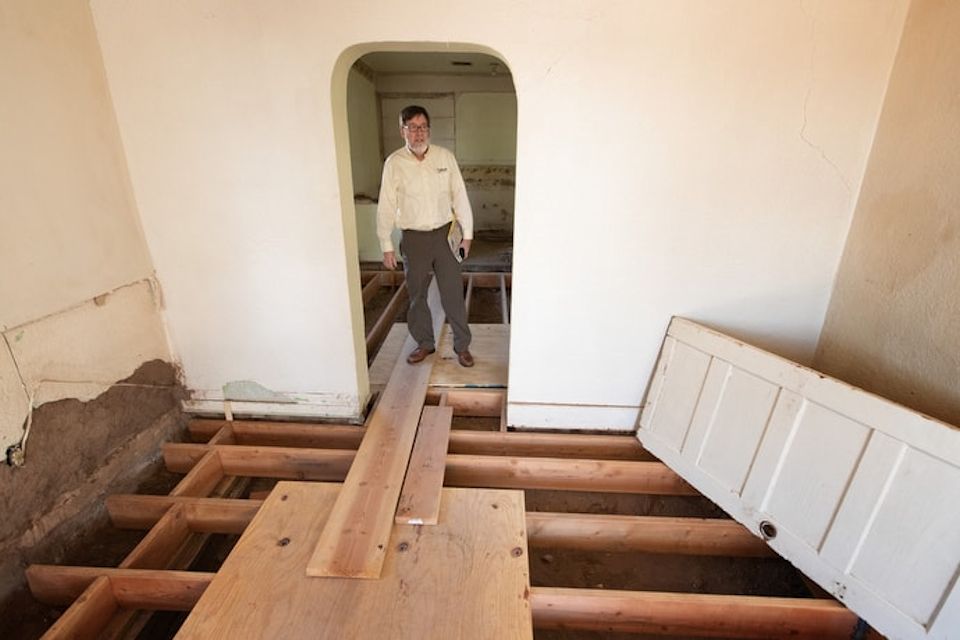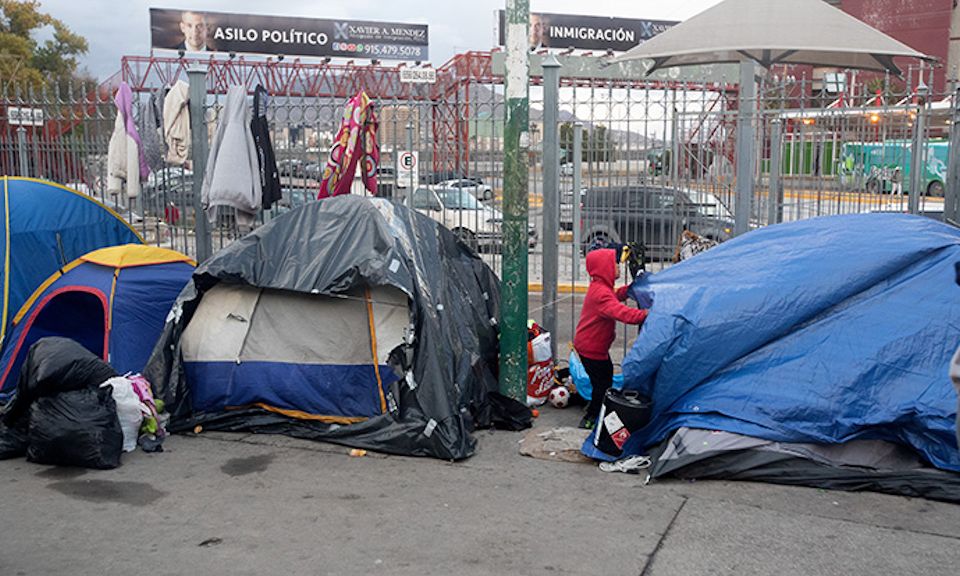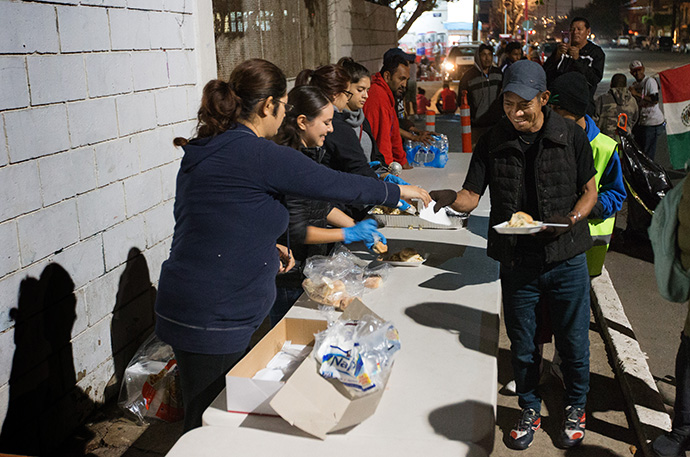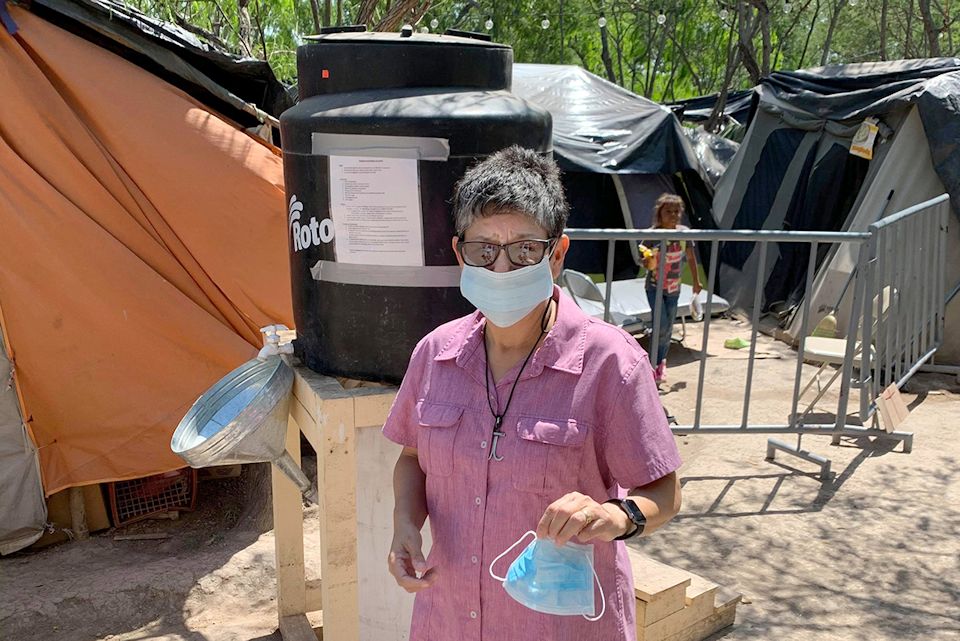United Methodists continue to minister daily with migrants at the U.S.-Mexico border. The pandemic has ended face-to-face interaction with those living in camps.
KATHY L. GILBERT
UM News
Cindy Johnson, a United Methodist deaconess who lives in Brownsville, Texas, has a heart for the thousands of migrants who stream into this area of the country seeking better, safer lives.
Until COVID-19, she was personally visiting migrants almost daily as they camped under the Matamoros Bridge — which connects the United States and Mexico — as they waited for a chance to ask for asylum.
The coronavirus hasn’t stopped people from seeking asylum but it has stopped Johnson and others from doing face-to-face ministry.
Small groups of people who once camped under the bridge, waiting their turn to seek asylum, have been moved to a camp by the river. Their numbers have swelled to more than 2,500 in a tent city.
Johnson is only allowed to go to the tent city on Tuesdays for two hours, and she has to stay away from the migrants. She reports that a team of doctors from Global Response Management is providing full-time primary care services and operating a pharmacy. On her days at the camp, she takes requests from the doctors and buys needed supplies with donations sent to El Valle District, Rio Grande Conference.
She recently bought $1,000 worth of bug spray for those living in the tents. “It’s Texas, and it’s getting hot, and there are a lot of mosquitos,” she said in an interview with UM News.
Johnson said the camp does have wash stations and has cordoned off a section for people who get sick. She is no longer able to bring food, but others are doing that, she said.

The Brownsville Herald recently reported on the camp.
Johnson said the conditions are “horrible,” but she has hope. “Please keep our migrant brothers and sisters in your prayers.”
Las Cruces, New Mexico
The Rev. George Miller, El Calvario United Methodist Church, reports COVID-19 has made it challenging to do ministry while maintaining health directives.
Miller said most asylum seekers had been returned to Mexico since the Trump administration closed the border.
In November 2019, The United Methodist Task Force on Immigration visited El Calvario United Methodist Church as well as migrant camps near the Paso del Norte International Bridge, which connects Juárez with El Paso. United Methodists volunteered at that camp.
“With the rush to stock up on supplies, both in Mexico and the U.S., the shelters have somewhat been forgotten. Most in-kind donations have dried up with health and cleaning items being in short supply, no diapers, sanitizing stuff, etc. So we have to take over the border ‘emergency’ items as we can,” Miller said.
El Calvario has started a “check challenge,” encouraging people to earmark some or all of the COVID-19 stimulus checks to help others.
Miller said immigrants could not benefit from various government stimulus packages, and they are the first people to be laid off.
“I will mention two families, one where the father was laid off from a restaurant and the other a mother who cleaned houses and now is not welcomed in the houses because of virus fears. They are desperate and don’t know where to turn to,” he said.
The church still provides supplemental food and clothing, and is trying to provide some financial assistance, Miller said.
“We are committed to being a presence in southern New Mexico for all immigrants. We are hiring a program director for immigration services,” Miller said.

Tijuana, Mexico, and San Diego
The Rev. Joel Hortiales, director of Hispanic/Latino Ministries and Border Concerns for the California-Pacific Conference, and Bishop Felipe Ruiz Aguilar of The Methodist Church of Mexico, Tijuana, have been working together. They serve migrants trying to cross from Tijuana to San Diego.
Large waves of people are no longer coming in, Hortiales said. A large migrant camp run by the Mexican National Guard is keeping residents in quarantine and not allowing church volunteers to visit inside, he added.
“There are no cases of COVID-19 yet in the shelters, but the city of Tijuana last week reported 400 cases, and the city of Mexicali had 20,” he said. As in most of the U.S., citizens are asked to stay at home until May.
The feeding program of the Iglesia Metodista de Mexico in Tijuana closed their doors on April 3, he said.
“Bishop Ruiz said that the government is allowing the feeding program to prepare food to give away on the street outside of the premises with masks and the appropriate distance. And the Methodists are doing their best to help,” Hortiales said.
Like most churches in the U.S., El Faro: The Border Church/ La Iglesia Fronteriza is holding services online. For many years, The Methodist Church of Mexico and The United Methodist Church in the U.S. have shared communion every Sunday across the border from each other, but can’t do that now. That was the only connection many families have with loved ones.
Lydia Patterson Institute, a United Methodist college-preparatory school in El Paso, Texas, shifted to online classes because of COVID-19. Seventy percent of the students attending the school are from Juárez, said school president Socorro de Anda.

Advocating in the US
More than 200 faith-based organizations, including The United Methodist Board of Church and Society, sent a letter to the Trump administration, Congress, and governors asking them to include asylum seekers in emergency response to COVID-19.
The letter followed an earlier statement from the Interfaith Immigration Coalition, calling for an end to medical prejudice against migrants.
“Immigrants, refugees, and asylum seekers are part of our communities. They serve on the front lines of the pandemic, keep our supply chains working, and pay taxes. To face the fear of deportation, being separated from their families or not being able to access healthcare while they do so is not only tragic but unnecessary,” said the Rev. John L. McCullough, a United Methodists who is president and CEO of Church World Service, an ecumenical advocacy group.
“Many of those who will be vulnerable without the protections we call for are married to, parents of, or children of American citizens. These are concrete steps our elected officials can take to protect them, ensuring that the fear of COVID-19 is not compounded with cruelty.”
Justice for Our Neighbors
The National Justice for Our Neighbors is a United Methodist network of attorneys who offer full legal representation at 18 sites across the U.S. Rob Rutland-Brown, director of the network, said their work continues during the pandemic.
Rutland-Brown issued a call to action to stop an executive order that took effect April 23 and will last for 60 days to suspend immigration into the U.S.
The order states it protects the nation’s workforce, but Rutland-Brown said it was clear to JFON that the aim is to curb family-based immigration. He said the order would harm U.S. citizens and green card holders — immigrants allowed to live and work in the U.S. — seeking to reunite with their families.
“Many of them (clients) lack access to food, are unable to work, and have anxiety about seeking health care, all while worrying about their immigration status. Some clients are still being required to attend crowded courtrooms, forced to face the risk of contracting the coronavirus or being deported,” he said.
Rutland-Brown said the attorneys are interacting remotely with clients as they figure out the best ways to carry out the mission of Justice for Our Neighbors in “uncharted waters.”
“This proclamation is antithetical to the shared values of our nation, our faith, and of our Justice for Our Neighbors Network,” he said. “We welcome immigrants. We know they strengthen our communities and our economy. We believe all families belong together.”
~ National Justice For Our Neighbors is a ministry partner with EngageMI.
Last Updated on January 30, 2024

